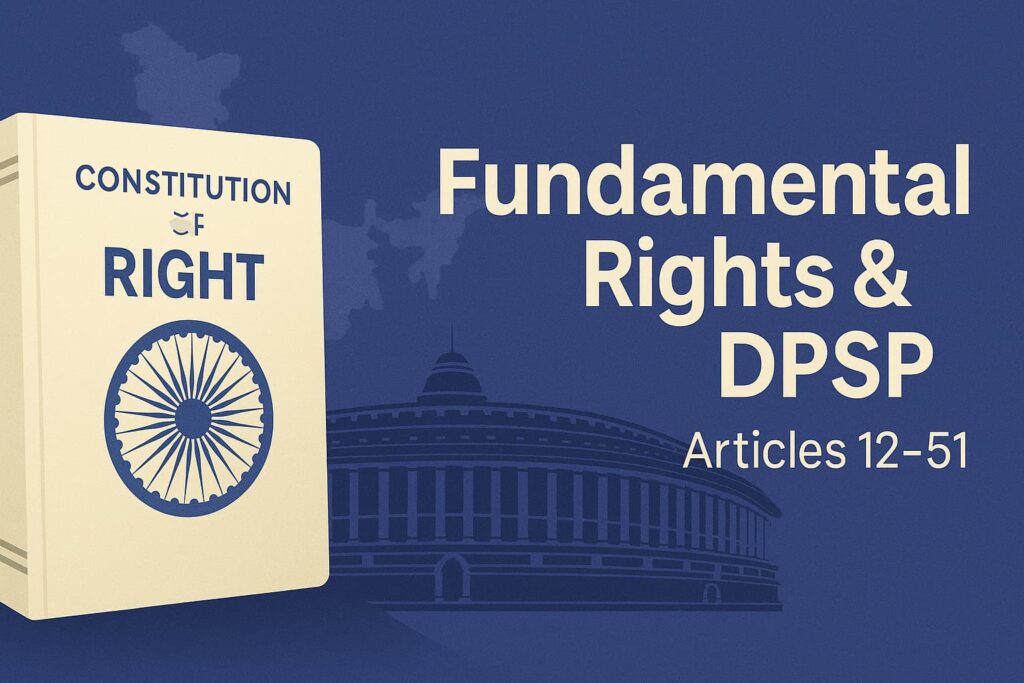Indian Constitution MCQs — Fundamental Rights, Religion & Remedies
Practice exam-level Indian Constitution MCQs covering Equality & Reservations, core Freedoms, due-process protections, Religion & Minority rights, and Constitutional Remedies — ideal for PC/PSI/KPSC, SSC and UPSC prelims.
This set focuses on high-yield Articles from Part III: non-discrimination and reservations (Art. 15–16), abolition of untouchability & titles (Art. 17–18), freedoms and reasonable restrictions (Art. 19), due-process & detention safeguards (Art. 20–22), right against exploitation (Art. 23–24), freedom of religion & education (Art. 25–30), Ninth Schedule & DPSP shield (Art. 31B–31C), and enforcement through writs (Art. 32–35). Each question includes a one-line explanation for quick retention.
Indian Constitution Quiz
Quick Exam Pointers — Fundamental Rights
Public places: no discrimination on 5 grounds (Art. 15(2)).
Religion, race, caste, sex, place of birth are barred grounds; financial status is not on the list—popular “NOT” MCQ.
Special provisions & EWS (Arts. 15(4) & 15(6)).
State can favor SEBCs/SCs/STs; EWS reservations capped at 10% in education. Distinguish from Art. 16 which is about jobs.
Equal opportunity in jobs (Art. 16) + key exceptions.
Parliament may require residence for certain posts (16(3)); general reservation ceiling is 50% with carry-forward covered by 16(4B).
Abolition of “Untouchability” (Art. 17).
Practice in any form is forbidden; disabilities arising are offences—straightforward one-liner often asked.
No titles from the State, except two (Art. 18).
Only military and academic distinctions permitted; remember “Padma awards ≠ titles” in exam logic.
Core freedoms (Art. 19): speech, association, movement, residence, profession.
All subject to “reasonable restrictions” e.g., sovereignty & integrity, security of State, public order—quote bases to beat traps.
Procedural shields (Arts. 20–22).
No ex post facto, double jeopardy, or self-incrimination (Art.20); right to counsel & 24-hour production (Art.22); preventive detention needs Advisory Board after 3 months.
Life, education & exploitation (Arts. 21, 21A, 23–24).
Art.21 protects life & personal liberty; 21A ensures free education 6–14; Arts.23–24 ban trafficking/begar and child labour under 14 years in hazardous work.
Flashcards Recap — Fundamental Rights (Articles 12–21A)
What does Article 12 define?
The term “State” — includes Govt, Parliament, State legislatures, local & other authorities.
What does Article 13 state?
Laws inconsistent with Fundamental Rights are void.
Which Article guarantees equality before law?
Article 14.
Which Article abolishes Untouchability?
Article 17.
Which Article guarantees six freedoms like speech, assembly, and movement?
Article 19.
What does Article 20 protect?
Protection in respect of conviction for offences (double jeopardy, ex-post facto laws, self-incrimination).
What is the significance of Article 21?
Right to life and personal liberty.
Which Article provides free & compulsory education for children 6–14 years?
Article 21A.
That wraps up your rapid revision of Fundamental Rights through MCQs. By practicing questions on Articles 14–16 (equality & public employment), 17–18 (abolition of untouchability; no titles except military/academic), 19 (six freedoms with reasonable restrictions), 20–22 (criminal justice safeguards, the 24-hour rule, and preventive detention oversight), 21 & 21A (life/liberty and free education 6–14), and 23–24 (ban on trafficking, begar, and hazardous child labour), you’ve strengthened the high-yield core of Part III. For UPSC, SSC, and State PSC prep, revisit these items using spaced repetition—first after a day, then a week—focusing on common traps like Art. 19 restrictions, distinctions under Art. 15/16, and detention limits under Art. 22. Consistent practice will turn these provisions into instant recall on exam day.


